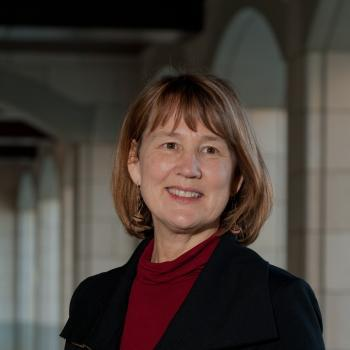We asked Professor Pamela Hinds, the Fortinet Founders Chair and Professor of Management Science & Engineering at Stanford University, to share some of her insights on how leaders can help build long-term, socially innovative, and globally responsible companies. Hinds, who is the Academic Director of Stanford’s Digital Transformation Program, studies the effect of technology on teams, collaboration, and innovation, and has conducted extensive research on the dynamics of cross-boundary work teams, particularly those spanning national borders.
Professor Hinds is serving as one of the Academic Directors of Frontiers in Social Innovation, a new custom executive educational program for CEOs and founders of up-and-coming start-ups and companies who are aspiring to go global. This high-touch, in-person program is designed and delivered by CKGSB and the Stanford Center for Professional Development and will be hosted on the Stanford University campus December 11-15, 2023.

Question: What do leaders need to know and do to survive and thrive in today’s global economy?
Professor Hinds: We are living a time of great uncertainty and profound change. Digital transformation is disrupting industries across the globe, as previously untouchable, established companies are being overtaken by smaller, nimble startups that can pivot quickly, innovate continuously, and smartly utilize the latest technology. In addition, two of the most challenging and defining issues of this century are climate and sustainability.
To be successful and to thrive, organizations must align their strategies, cultures, and processes to the changing digital landscape. To make significant positive global impact on the pressing challenges of our world, leaders and companies must also push the frontiers in technological, social, and business innovations.
To be successful and to thrive, organizations must align their strategies, cultures, and processes to the changing digital landscape.
Question: What tools, insights, and skills do entrepreneurs and leaders need to have to grow and scale their businesses?
Professor Hinds: Leaders need technical insights as well as creativity, cultural awareness, and entrepreneurial and management skills to apply and scale innovation in their respective industries. At the heart of transformation is creativity – thinking about things differently – which necessitates understanding and integrating different perspectives.
Stanford University has been at the forefront of innovation for nearly a century, creating pivotal technologies that have transformed the worlds of information technology, communications, health care, energy, business and beyond. Together with CKGSB, China’s research-driven business school, we have developed a program that draws upon faculty expertise from both the East and West and brings together knowledge and perspectives on innovation. The Frontiers in Social Innovation program will cover five important themes leaders need to understand and address: entrepreneurship and global impact, the frontiers of innovation, innovation strategy, leadership in a disruptive world, and sustainability.
At the conclusion of this program, participants will be well-positioned to tap into a broader network of global collaborators, supporters, and resources to accomplish their goals.
Question: Why is social innovation emphasized as a driving force for progress in this program?
Professor Hinds: The current time is aptly captured by the acronym VUCA, which stands for Volatility, Uncertainty, Complexity, and Ambiguity. Constant and unpredictable change is now the norm rather than an anomaly and requires system thinking and leadership. Social innovation embraces system perspectives and helps bridge gaps in existing systems. Social innovation empowers communities, fosters collaboration, promotes creativity, drives systemic change, and can adapt to an ever-evolving world. It offers new ways of thinking, problem-solving, and organizing to create a more inclusive, sustainable, and equitable future, all of which we believe can generate stronger and more agile global organizations.
Social innovation empowers communities, fosters collaboration, promotes creativity, drives systemic change, and can adapt to an ever-evolving world.
Question: What makes this program stand out?
Professor Hinds: The program brings faculty who conduct cutting-edge research to engage with participants from multiple geographies around the globe, where together they will explore solutions to pressing societal problems. Designed to foster cross-cultural dialogue, the program integrates interdisciplinary and diverse perspectives as well as front-line practices across industries.
Participants will be exposed to the mindsets and application of innovation through thought leadership, case studies, and real-world innovation practices based on the current cutting-edge and interdisciplinary research faculty conduct both in U.S. and in China. The idea is to inspire creativity and elevate the “can do” spirit and the capacity to act, lead, and drive real-world impact.
To practice and apply what participants are learning, the program includes a project component, where participants from diverse regions and backgrounds will work on project teams to develop action plans and solutions on relevant initiatives. Networking events will help engage participants connect with and learn from both fellow participants as well as faculty and industry speakers. Our academic directors will work closely to capture the daily learning and facilitate a direct application of program learning to the daily management practices of the participants.
All in all, this program is a great platform for a global community of innovators to connect and collaborate. They will be given the knowledge and tools to further enhance the effectiveness of collaboration with growth- and social-minded peers from global regions.
